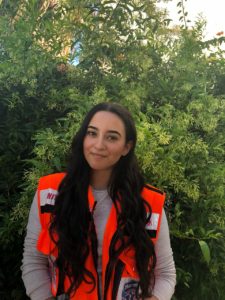Women in Peace subject of study at the Kroc Institute for Peace and Justice
 The Kroc Institute for Peace and Justice at the University of San Diego is focusing on the role women can play in peace-making, with panels planned Oct. 23, Nov. 7, and Nov. 8 on the campus. Featured will be Rosa Emilia Salamanca, a Colombian who was instrumental in creating peace between rebels and the government; Roxana Cristescu, who has helped to mediate disputes in Ethiopia, Sudan, Kosovo, Moldova, Ukriane, and Lebanon; Mariam Yazdani, a Pakistani who helps resolve disputes among community based organizations, international organizations, and local governments; and Amira Abdulrahman Hussein Timan of Sudan, who currently serves as the humanitarian affairs officer with the United Nations African Union peacekeeping mission in Darfur. Further information concerning these programs may be obtained from program officer Jennifer Bradshaw via jenniferbradshaw@sandiego.edu. – From the Kroc Institute for Peace and Justice
The Kroc Institute for Peace and Justice at the University of San Diego is focusing on the role women can play in peace-making, with panels planned Oct. 23, Nov. 7, and Nov. 8 on the campus. Featured will be Rosa Emilia Salamanca, a Colombian who was instrumental in creating peace between rebels and the government; Roxana Cristescu, who has helped to mediate disputes in Ethiopia, Sudan, Kosovo, Moldova, Ukriane, and Lebanon; Mariam Yazdani, a Pakistani who helps resolve disputes among community based organizations, international organizations, and local governments; and Amira Abdulrahman Hussein Timan of Sudan, who currently serves as the humanitarian affairs officer with the United Nations African Union peacekeeping mission in Darfur. Further information concerning these programs may be obtained from program officer Jennifer Bradshaw via jenniferbradshaw@sandiego.edu. – From the Kroc Institute for Peace and Justice
*
18-year-old girl saves lives in two countries

Trained in Israel’s United Hatzalah program, Coral Sellouk, 18, has two saved lives to her credit – one in Israel and one in the United States. In the first instance, she answered a call for assistance in Rehovot, where she was part of a team administering CPR for 90 minutes to a man who was unconscious. Eventually, they got the man’s pulse back. After returning to her home in West Hollywood, she saw an unconscious man lying on the sidewalk near her home. She pulled on her gloves, took his pulse, called 911, and performed compressions until an ambulance arrived. She later was notified that the man had made a full recovery in the hospital.
“You never expect anything like this to happen,” Sellouk reflected. “You see it in the movies and you hear it from your instructor, but you never actually expect it to happen in front of you. In a million years I never thought it would happen to me. I took the lead on some calls in Israel but I always had a team with me to correct me if something was wrong. Here, outside of my own house, next to my own driveway, I was by myself with this man’s life literally hanging in the balance. It was in my hands and everything was up to me. That is something that I will never forget.” — From United Hatzalah
*
‘Safe Haven’ tells immigration attorney’s story
 Michael Wildes can justifiably claim that immigration law is in his blood – his father Leon attained international fame defending John Lennon from deportation during the 1970s. Inspired to join his father after a career as a federal prosecutor, Wildes rose to managing partner of the law firm of Wildes & Weinberg. There he has participated in a string of immigration cases that required a Kevlar vest under his business suit and would seem more at home in the pages of an espionage thriller.
Michael Wildes can justifiably claim that immigration law is in his blood – his father Leon attained international fame defending John Lennon from deportation during the 1970s. Inspired to join his father after a career as a federal prosecutor, Wildes rose to managing partner of the law firm of Wildes & Weinberg. There he has participated in a string of immigration cases that required a Kevlar vest under his business suit and would seem more at home in the pages of an espionage thriller.
In Safe Haven in America: Battles to Open the Golden Door (ABA Publishing; September 4, 2018) Wildes describes representing defecting KGB agents, whistle blowers, disillusioned Saudi diplomats, accused terrorists, professionals and celebrities, such as First
Lady Melania Trump and her family and soccer legend Pele. But he’s also worked to help the victims of international child kidnapping cases, families all but destroyed by the attack on the World Trade Center, and a DACA recipient who survived a hate crime.
Wildes’ opinion as an attorney has been sought by a wide range of news organizations, from Fox News to MSNBC, where he speaks from his hard-won experience of nearly a quarter of a century on the front lines of the immigration struggle. From managing media expectations with bombshell political revelations to the day-to-day demands of running a practice with offices in four states, Wildes presents an in-depth appraisal of immigration, America’s most persistent political flash-point, along with startling disclosures from some of his most riveting cases.
Important topics from the book include:
- Why our immigration system is broken.
- How the state of immigration has changed since Richard Nixon tried to deport John Lennon.
- The need for comprehensive and uniform immigration reform.
- Why being strong on immigration doesn’t make the U.S. weak on homeland security.
- Benefits of offering a safe haven to attract human asset intelligence.
- Why we need a seamless fast track for foreign diplomats, whistle blowers and allies who have served during times of conflict.
- How sanctuary cities benefit the American public.
–From Meryl Moss Media
*
Preceding culled from news releases. Send yours to editor@sdjewishworld.com